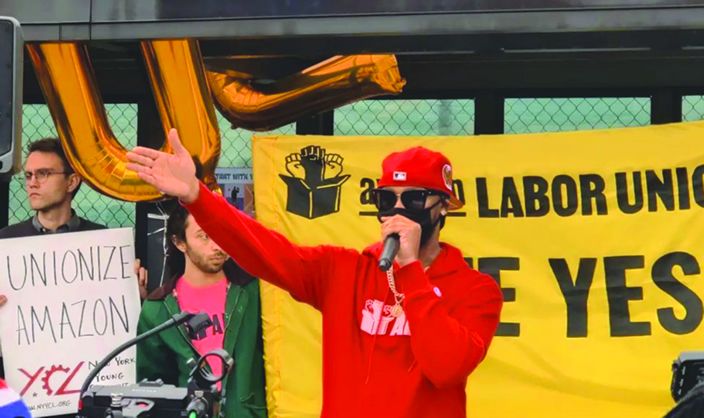
On 1 April 2022, Amazon workers at the JFK8 warehouse in the borough of Staten Island, New York, made history. They voted to join the Amazon Labor Union (ALU), an unthinkable victory against the second largest employer in the United States. Amazon has almost 1 million workers in the US and its market capitalisation is about $US1.7 trillion.
The ALU describes itself as a “worker-led movement to put power back in the hands of Amazon employees and establish our right to negotiate for a better, safer and more equitable workplace”. It was formed by former Amazon supervisor Christian Smalls, who was sacked in 2020 for organising a protest highlighting insufficient COVID-protection measures.
The ALU has five demands:
- union pay, $30/hour minimum wage for Tier 1 workers
- job security
- abolish mandatory overtime
- humane working conditions, longer breaks and workers to have access to their phones
- real time off – Amazon currently offers no sick leave and barely any paid time off.
Amazon will not take the formation of unions within its warehouses lying down. The online retail giant is challenging the outcome at JFK8 and filing objections to overturn the vote that formed the first union in the company’s history.
Amazon claims that the National Labor Relations Board (NLRB) and the ALU suppressed voter turnout. It also alleges that organisers supplied cannabis to workers ahead of the vote in a bid to firm up support for the union.
ALU’s Vice-President of membership, Connor Spence, said, “We urge Amazon to cease these childish legal games, respect the voices of their workers, and engage in behaviour that is more becoming of ‘Earth’s Best Employer.’”
Countering Amazon’s objections, the ALU has laid out 21 objections of its own including claims of intimidation, retaliation, and surveillance of workers.
ALU may have won the first battle but the real fight – winning a collective bargaining agreement – is yet to come. Assuming the objections filed by Amazon are all cleared, the ALU will become formally certified to represent workers.
Next, bargaining will begin for the ALU and Amazon to come up with and agree on a contract. The weakness of US labour laws is set to play into Amazon’s favour as the company will go to great lengths to bust the newly formed union.
Amazon has unlimited resources and will use whatever tools it has at its disposal to delay or stall contract bargaining. The law provides it with a path to draw out negotiations and push the date out as far as possible. Amazon will be hoping to bury the union in bureaucratic tape and stall negotiations so the union loses momentum.
Politicians including Senator Bernie Sanders and President Joe Biden have both come out in support of Amazon workers. In a Tweet, Sanders said “Without the workers, there would be no Amazon.” White House Press Secretary Jen Psaki has said Biden believes “every worker in every state should have a free and fair choice to join a union”.
In what has been described as a David and Goliath battle, the formation of Amazon’s first union highlights how just one person can make a difference. When Christian Smalls decided to set up a tent outside the JFK8 warehouse, many doubted him. Yet he persisted.
His supporters on the inside organised and spoke relentlessly about the value of forming a union and how it could help them collectively lift wages and improve job security and conditions. Now the ALU is launching a nationwide campaign organising and empowering workers to unionise the more than 110 Amazon workplaces in the US.
In the wake of the victory at Staten Island, Smalls made an iconic celebratory remark that went viral on social media. He said, “We want to thank Jeff Bezos for going to space because while he was up there, we were organizing a union.” On 25 April, workers at a second Amazon warehouse on Staten Island, LDJ5, will vote on whether to form a union.
Union membership in the US has been in decline for decades. Yet thanks to the formation of the ALU and the recent move by nine US Starbucks stores voting to organise, momentum is building. The worker-led organising crusade by the likes of Christian Smalls and others could see a seismic shift in the US labour movement. The formation of the first Amazon union shows workers throughout the US – and around the world – just how powerful grassroots, worker-led organising can be. How Amazon responds and how it treats its workers will also send a signal to consumers. Watch this space!



































































































































